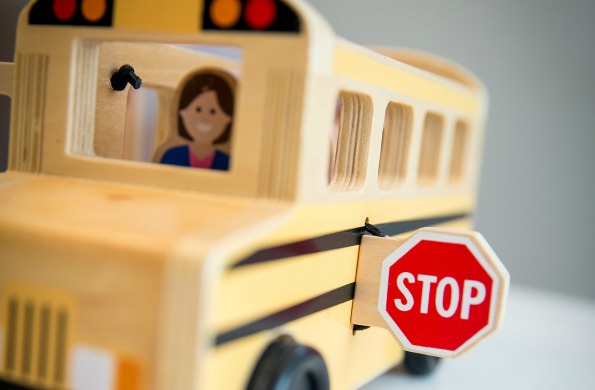This article was previously published on Latterdaysaintwoman.com
School starts in a few weeks, and for your little one, it’s the very first day. You hate to see him go, but since he is going, you want him to look forward to kindergarten and to have fun once he’s there. How do you prepare for the special day?
Your Attitude Towards Kindergarten:
Your attitude is very important as you prepare him for his special day. If you seem nervous, worried or overly sad, he will presume school is going to be a miserable experience. It’s natural for you to feel sadness as the school year approaches. An important stage of your life with your child is ending. However, that is a grown-up issue, so discuss it with other adults (and be certain he can’t hear you).
When talking to your child, express your pride in how well he is growing up and in how prepared he is for his special day. If you want to share some of your sadness, don’t make a big deal about it. Just tell him this is a new experience and both of you might be a bit sad or worried, but you know he will have fun in school, and you will be okay too.
Make plans for yourself.
Since your attitude will make a big difference, you need to work on yourself before you can help your child. Spend his first day at school doing something special, so you’ll look forward to it and be too busy to worry. Go off with a friend, schedule a date with your spouse or spend the entire day reading in a bubble bath without interruption. If you have other children, play with them. If you are sending your only or last child to school, make a long range plan—write the book you’ve always intended to write, go back to school yourself, plant a garden or do something else that helps you move into a new place in your life.

Make the shopping trips special.
There will be back to school shopping to do. Take care not to grumble about the costs, and make each trip a treasure, perhaps involving a special lunch out or at home. Let your child help choose his clothes and supplies.
Find out what will happen at school and talk about it.
“I’ll bet you’re excited that your classroom has an art center. You love art! I wonder what you will learn how to make this year?” “I’m so proud that you’re going to learn how to read. I’ll still read to you, of course, but now you’ll be able to read books yourself too.” (Children worry that their parents will stop reading to them if they learn to read.)
Speak positively of his teacher and try to think that way too.
This isn’t always easy. Sometimes it is frustrating when the teacher becomes your child’s new hero and he hangs on her every word—even when she tells him things you told him that he didn’t like. Occasionally, there is good reason to dislike or distrust a teacher. If that happens, go to the school and talk to the teacher gently until you reach the facts. At home however, be as supportive as possible.
Practice in advance how to handle problems
If your child didn’t go to preschool, there may be situations he isn’t used to handling. Practice at home for those kinds of situations, such being teased, needing to go to the restroom, or having the teacher ask the child to do something you don’t allow him to do. Role play during Family Home Evening or act out puppet stories, but unless there is no way around it, don’t specify the problems as happening at school. Treat them as things that could happen anywhere. We taught our children to “do what your teacher says unless she tells you to do something you know you shouldn’t do.
Then politely say you aren’t allowed to do that, and if she still wants you to do it, tell her you need to call your parents for permission.” Usually this involved the Word of Wisdom. Make sure your child knows exactly what you allow him to eat and drink. If you don’t allow sodas with caffeine, for instance, chances are he doesn’t know which ones he can’t have, and may also not be aware of the rules concerning tea. (Yes, I know those sodas aren’t against the Word of Wisdom, but many of us don’t drink them,anyway. My non-LDS parents didn’t allow caffeine for children.)
Arriving at School the First Day
When you arrive at the school, take your child into the classroom, introduce him to the teacher, and help him get started with an activity unless the teacher has other instructions. Then tell him what time you will return. Leave. Don’t make a big fuss. Chances are he will be too busy to care. If he does cry, let the teacher handle it. I found, as a babysitter and as a nursery leader and Primary teacher, that children generally stop crying as soon as they are certain the parents aren’t coming back, although they may restart the show when they see the parents return at the end of the day. Don’t be fooled—go and don’t worry about it. Children survive this, even if they are scared at first.

To read more of Terrie’s articles, click the picture.
Celebrate the first day.
A week or so before the first day, start to make plans for something special right after school. Tell your child–or plan it with him–so he will have this to look forward to all day at school. He’s likely to be tired if he isn’t used to so much socialization and structure, but a trip for lunch or an after-nap ice cream will give him something else to think about if he’s nervous, and a reassurance that there will still be time for family even though he now has a schedule.
About Terrie Lynn Bittner
The late Terrie Lynn Bittner—beloved wife, mother, grandmother, and friend—was the author of two homeschooling books and numerous articles, including several that appeared in Latter-day Saint magazines. She became a member of the Church at the age of 17 and began sharing her faith online in 1992.






